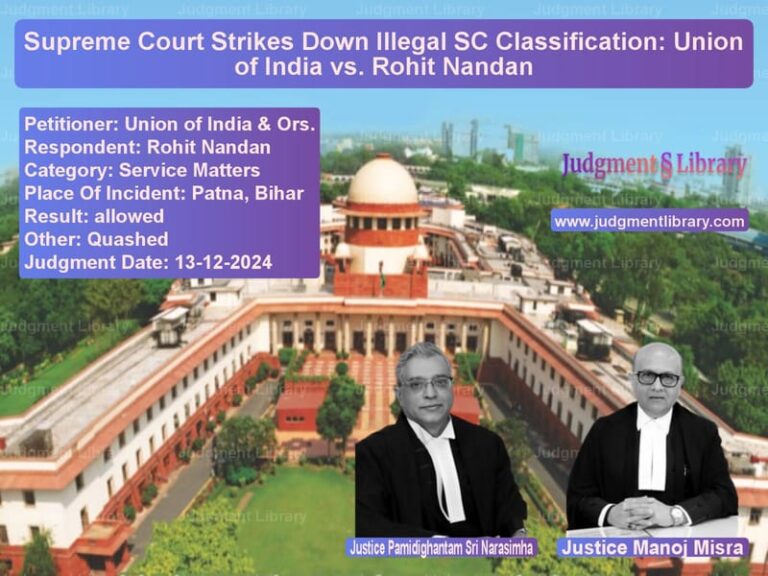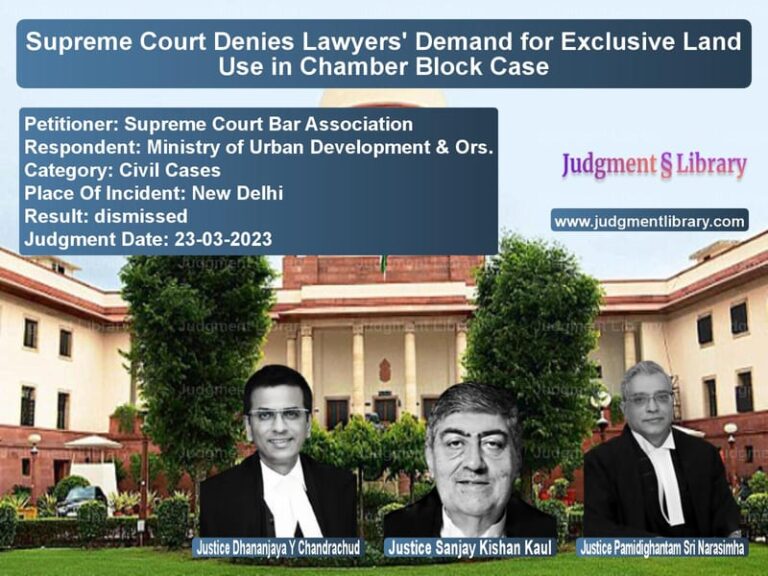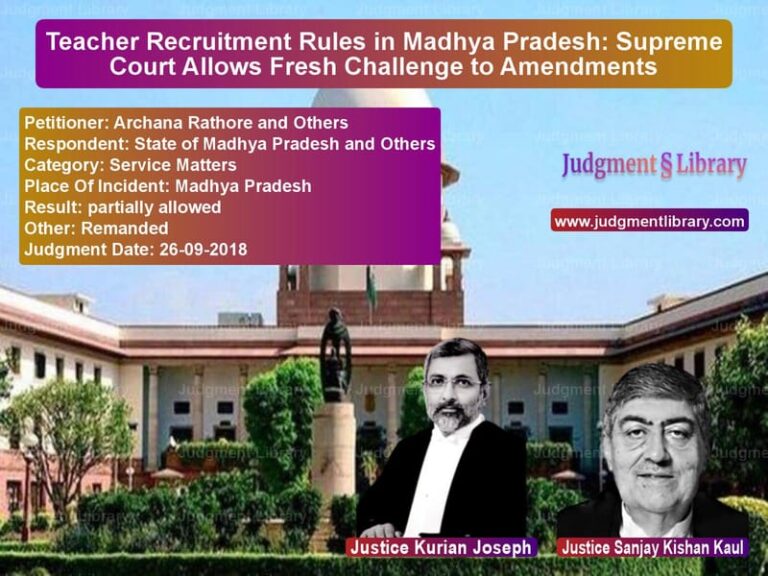Supreme Court Upholds Conviction in Dowry Death Case Under IPC Sections 498A and 306
The Supreme Court of India, in the case of Gumansinh @ Lalo @ Raju Bhikhabhai Chauhan & Anr. vs. The State of Gujarat, upheld the conviction of two accused under Section 498A and Section 306 of the Indian Penal Code (IPC) for abetting the suicide of a woman due to cruelty and harassment for dowry. The case involved the death of a woman named Tahera, who had been subjected to physical and mental abuse by her husband and mother-in-law. The Supreme Court dismissed the appeals of the accused and upheld the judgment of the Gujarat High Court, emphasizing the significance of Section 113A of the Indian Evidence Act, which presumes abetment of suicide if a married woman takes her life within seven years of marriage.
Background of the Case
The prosecution’s case was that Tahera was married to Gumansinh (Appellant No. 1) on April 27, 1997. She lived with her husband and mother-in-law (Appellant No. 2). The prosecution alleged that:
- The husband frequently demanded Rs. 25,000 from Tahera’s father to purchase buffaloes for his milk business.
- Due to financial difficulties, her father could not meet this demand.
- The husband physically assaulted Tahera for failing to bring the money.
- The mother-in-law constantly quarreled with her, criticizing her cooking and household skills.
- On December 14, 1997, after enduring months of cruelty, Tahera consumed poison at her matrimonial home and died.
Following her death, her father filed a complaint at the Padra Police Station, leading to a chargesheet under Sections 498A and 306 IPC against the accused.
Trial Court Proceedings
The Trial Court found the accused guilty, holding that:
- The prosecution proved that Tahera was harassed and beaten due to her failure to bring dowry.
- The accused abetted her suicide through persistent cruelty.
- Under Section 113A of the Indian Evidence Act, abetment of suicide is presumed when a married woman dies within seven years of marriage due to cruelty.
- The accused were sentenced to one year rigorous imprisonment for 498A IPC and two years rigorous imprisonment for 306 IPC, along with fines.
High Court’s Ruling
The accused appealed before the Gujarat High Court, arguing:
- There was no direct evidence linking them to abetment.
- The demand for money was not a dowry demand but a loan request.
- Tahera suffered from mental illness and was under treatment.
- Only relatives were examined as witnesses, making the prosecution’s case unreliable.
The Gujarat High Court rejected these arguments, ruling that:
- The prosecution’s witnesses, including Tahera’s father and mother, consistently testified about dowry demands and physical abuse.
- There was no medical evidence proving that she had mental illness.
- Even if no independent witnesses were available, close family members’ testimonies were sufficient.
- Since the prosecution proved cruelty and suicide within eight months of marriage, the presumption under Section 113A of the Evidence Act applied.
- The High Court upheld the Trial Court’s conviction.
Supreme Court’s Key Observations
1. Applicability of Section 113A of the Evidence Act
The Supreme Court highlighted that Section 113A of the Evidence Act creates a presumption of abetment in cases where a married woman commits suicide due to cruelty. The Court held:
“When the prosecution establishes cruelty, and the victim commits suicide within seven years of marriage, the presumption of abetment under Section 113A applies unless rebutted by the defense.”
2. Demand for Rs. 25,000 Was Dowry Harassment
The Court rejected the accused’s claim that the demand for Rs. 25,000 was a request for a loan, stating:
“The demand was made persistently and linked to physical violence. This constitutes harassment for dowry and is punishable under Section 498A IPC.”
3. Role of Witness Testimonies
The accused argued that only family members testified. The Supreme Court ruled that in cases of domestic abuse, independent witnesses are rare:
“Most incidents of cruelty occur within the privacy of the home. Testimonies of close family members, if credible, are sufficient.”
4. No Medical Evidence of Mental Illness
The accused claimed that Tahera was suffering from mental illness. However, the Court noted that:
- No medical records were produced to support this claim.
- The accused did not mention mental illness during their defense under Section 313 CrPC.
Thus, the Court held that the suicide was a result of cruelty and harassment, not mental illness.
Final Judgment
The Supreme Court dismissed the appeals, affirming the convictions under Section 498A and 306 IPC. The Court ruled:
- The conviction and sentencing by the Trial Court and High Court were legally sound.
- The accused had not rebutted the presumption of abetment.
- The appeal was dismissed with no relief granted.
Implications of the Judgment
1. Strengthening Legal Protection for Women
The judgment reinforces the strict application of Section 498A to protect married women from dowry-related abuse.
2. Clarifying Burden of Proof Under Section 113A
The ruling clarifies that once cruelty is proven, the burden shifts to the accused to prove they did not abet the suicide.
3. Ensuring That Dowry Demands Are Not Disguised
The Court ruled that persistent financial demands from a wife’s family, even if claimed as loans, amount to dowry harassment.
4. Accepting Family Members as Witnesses
The decision acknowledges that domestic abuse often lacks independent witnesses, making close family testimonies crucial.
Conclusion
The Supreme Court’s ruling in Gumansinh @ Lalo @ Raju Bhikhabhai Chauhan & Anr. vs. The State of Gujarat is a landmark decision reinforcing India’s commitment to protecting women from domestic abuse and dowry harassment. By upholding the convictions under Sections 498A and 306 IPC, the Court reaffirmed that continuous cruelty leading to suicide must be treated as a serious offense under the law.
Petitioner Name: Gumansinh @ Lalo @ Raju Bhikhabhai Chauhan & Anr..Respondent Name: The State of Gujarat.Judgment By: Justice S. Abdul Nazeer, Justice Krishna Murari.Place Of Incident: Vadodara, Gujarat.Judgment Date: 03-09-2021.
Don’t miss out on the full details! Download the complete judgment in PDF format below and gain valuable insights instantly!
Download Judgment: gumansinh-@-lalo-@-r-vs-the-state-of-gujarat-supreme-court-of-india-judgment-dated-03-09-2021.pdf
Directly Download Judgment: Directly download this Judgment
See all petitions in Dowry Cases
See all petitions in Domestic Violence
See all petitions in Alimony and Maintenance
See all petitions in Suicide Cases
See all petitions in Judgment by S. Abdul Nazeer
See all petitions in Judgment by Krishna Murari
See all petitions in dismissed
See all petitions in supreme court of India judgments September 2021
See all petitions in 2021 judgments
See all posts in Criminal Cases Category
See all allowed petitions in Criminal Cases Category
See all Dismissed petitions in Criminal Cases Category
See all partially allowed petitions in Criminal Cases Category







